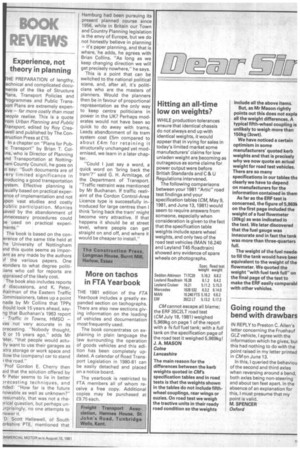EV1EWS
Page 15

If you've noticed an error in this article please click here to report it so we can fix it.
Experience, not theory in planning
HE PREPARATION of lengthy, echnical and complicated docuents of the like of Structure ans, Transport Policies and rogrammes and Public Transart Plans are extremely expenive — far more costly than most eople realise. This is a quote ram Urban Planning and Public ransport, edited by Roy Creswell and published by The Contruction Press at £15.
In a chapter on "Plans for Pubic Transport" by Brian T. Colins, who is Director of Planning nd Transportation at Nottingam County Council, he goes on o say: "Such documents are of ery limited significance in reducing a good transportation ystem. Effective planning is sually based on practical experence of implementation and not pan vast studies and costly ublic participation. Monies aved by the abandonment of nnecessary procedures could e used on practical experients."
The book is based on the conerence of the same title held at he University of Nottingham Ind this quote seems as imporrant as any made by the authors )f the various papers. One wonders to what degree politi;ians who call for reports are ippraised of the likely cost, The book also includes reports )f discussions, and K. Peter, :hairman of the Eastern Traffic :ommissioners, takes up a point nade by Mr Collins that TPPs .hould look 15 years ahead, sayng that Buchanan's 1963 report Traffic in Towns, HMSO — vas not very accurate in its precasting. "Nobody thought, 0 or 15 years ago," adds Mr 'eter, "that people would actuIly want to use their garages as xtra storage or work space and How the (company) car to stand 1 the road."
Prof Gordon E. Cherry then aid that the solution offered by 1r Peter seems to lie in better recasting techniques, and nded: "How far is the future nowable as well as unknown?" resumably, that was not a rhe)rical question, but perhaps unArprisingly, no one attempts to nswer it.
D. Scott Hellewell, of South orkshire PTE, mentioned that Hamburg had been pursuing its present planned course since 1956, while in Britain our Town and Country Planning legislation is the envy of Europe, but we do not honestly believe in planning — it's paper planning, and that is where, he adds, he agrees with Brian Collins. "As long as we keep changing direction we will get precisely nowhere," he says.
This is a point that can be switched to the national political scene, and, after all, it's politicians who are the masters of planners. Would the planners then be in favour of proportional representation as the only way to keep centre politicians in power in the UK? Perhaps moderates would not have been so quick to do away with trams. Leeds abandonment of its tram system cost £5m compared to about £4m for retaining it structurally unchanged yet modernised, we learn in a later chapter.
"Could I just say a word, a quick word on 'bring back the tram'?" said G. H. Armitage, of the Department of Transport. "Traffic restraint was mentioned by Mr Buchanan. If traffic restraint of the Cordon Control-Area Licence type is successfully introduced for large centres then I think 'bring back the tram' might become very attractive. If that happens it should be at street level, where people can get straight on and off, and where it would be cheaper to install,"




































